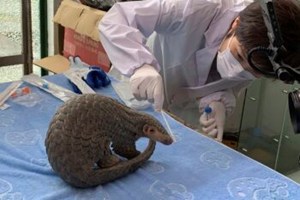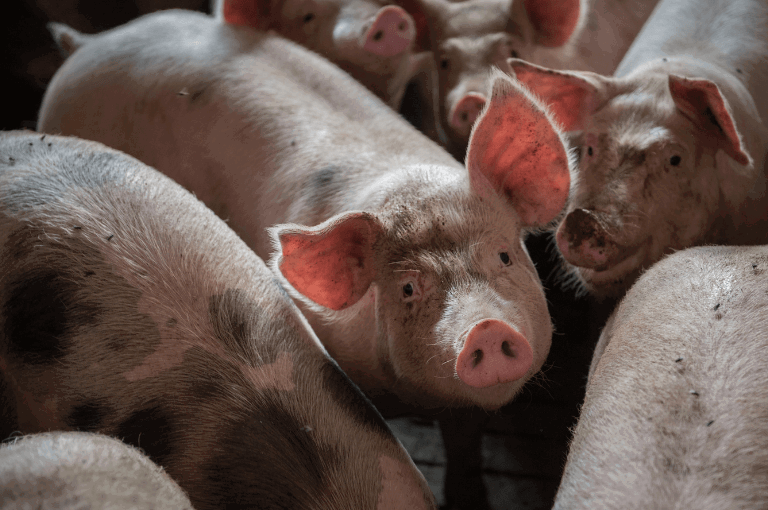2/22/2021
Written by Philip Lymbery
It would be hard to find another mammal more persecuted, or more bewitching, than the pangolin.
February 20th was World Pangolin Day. An opportunity for us all to focus the world’s attention on the tragic circumstances surrounding this unique, beautiful creature. Circumstances brought about by humankind that are leading to almost certain extinction for this gentle, shy species.

Few people have seen a pangolin, a scaly mammal akin to anteaters and armadillos, though eight species are found on two continents: Africa and Asia.
They have the tragic distinction of being the most trafficked mammal in the world. In 2019, an estimated 195,000 pangolins were trafficked for their scales (Challender, et. al, 2020).
In the consumer markets of Asia, pangolin meat is considered a delicacy and pangolin scales are used in traditional medicine and folk remedies to treat a range of ailments, from asthma to rheumatism and arthritis. Although pangolin scales are made of keratin, the same substance as human nails, they have been used in Chinese medicine for centuries. No medicinal value has ever been proven.
It’s hard to imagine that, according to the African Pangolin Working group, during 2018 alone, 48 tonnes of African pangolin scales were intercepted by the Asian authorities. 48 tonnes! It’s a sobering figure when you consider each pangolin has only 70 scales that weigh very little and that 48 tonnes represents only a proportion of the total scales trafficked.
The cruelty pangolins endure during trafficking is immense. Following capture, they are often kept captive for a week or 10 days without food and stored alive in anything from plastic bags to a container full of homemade beer, as was the fate of one African pangolin. One can only imagine the cruel ways in which they are killed and stripped of their scales.
Back in early 2020, the pangolin was cited as being at the center of the pandemic outbreak.

Whilst the origins of COVID-19 continue to be investigated, the suspected source was the Huanan Seafood Wholesale Market in Wuhan, which included a live animal section selling many species of wild and farmed animals. Although bats are thought to be the original source, scientists agree that deadly viruses are more likely to jump from an animal to a human via an intermediary, possibly a pangolin.
This shows strong parallels with other viruses that have emerged from a different route – industrial farming – such as highly pathogenic strains of Avian Influenza and Swine Flu. The effects of those diseases have been devastating; caused by keeping living, breathing, sentient creatures – chickens and pigs – in the most unnatural conditions: caged, crammed and confined on intensive farms.
While the coronavirus lockdowns in African countries have impaired the pangolin trade, it still goes on.
Despite the pandemic, illegal wildlife trafficking is the fourth most lucrative global crime directly contributing to the biodiversity crisis. To quote Professor Ray Jansen from the African Pangolin Working Group, “Pangolins have no natural enemies. Man is their absolute downfall.”
When all is said and done, it is important to consider that pangolins are a keystone species. They are inextricably linked to our ecosystem and are critical to the balance of biodiversity on our planet. In the words of eco-guide Ghislain Ngongo Njibadi, who works in Gabon in Western Africa: “If this species disappears, the forest will also surely die.”

It is time that we stopped encroaching into wild habitats for commercial greed and gain. That we stopped exploiting and persecuting animals on the basis of myth and that we acknowledged the fact that keeping animals, wild and farmed, in stressful, cramped and caged conditions is a breeding ground for disease. Whether it is the pangolin or a factory-farmed pig, the cruel conditions they experience are not only inhumane, but a serious global disease threat.
If the pandemic, and the pangolins highlighted by it, have taught us anything it must surely be that protecting humans means protecting animals, too. Treating animals with compassion has to be a cornerstone principle for a sustainable society. And in doing so, we will be protecting our planet for generations to come.
 |
Philip Lymbery is the Global CEO of Compassion in World Farming. |
